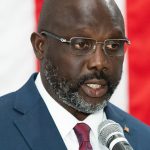Politics
Liberia Politics
This page explores Liberia’s political structure incorporating real-time RSS feed news and videos. By harnessing the power of RSS feeds, visitors can stay informed about the latest developments in Liberia’s politics as they happen. The dynamic nature of these feeds ensures that users receive up-to-the-minute updates on political events, policy changes, and significant milestones, enabling them to stay abreast of the ever-evolving political scene.

George Weah
25th President of Liberia
Incumbent
Assumed office
22 January 2018
Image credit
Liberia operates as a presidential republic, with a political structure that is based on a system of democratic governance. The country’s political system is characterized by a separation of powers among the executive, legislative, and judicial branches.
At the top of the political structure is the President of Liberia, who serves as the head of state and government. The President is elected by popular vote for a term of six years and is limited to two terms in office. The President has significant executive powers and is responsible for implementing policies, appointing government officials, and representing the country domestically and internationally.
The legislative branch in Liberia is represented by the bicameral National Legislature, which consists of the Senate and the House of Representatives. The Senate has 30 members, with two senators elected from each of the 15 counties. The House of Representatives has 73 members, who are elected by popular vote from electoral districts. The National Legislature is responsible for making laws, approving the national budget, and providing oversight of the executive branch.
The judicial branch in Liberia is independent and is responsible for interpreting and applying the law. The Supreme Court is the highest judicial authority in the country and serves as the final arbiter of legal disputes. It is supported by lower courts, such as the circuit courts and magistrate courts, which handle various legal matters. Political parties play a crucial role in Liberia’s political landscape, with elections being a fundamental aspect of the democratic process. Civil society organizations and media outlets also contribute to public discourse and provide checks and balances on the government. In conclusion, Liberia’s political structure is based on a presidential republic, with a separation of powers among the executive, legislative, and judicial branches. The President holds executive authority, while the National Legislature enacts laws and provides oversight. The judiciary operates independently and upholds the rule of law.
Unless other sources are listed, original content is provided by ChatGPT. ChatGPT may produce inaccurate information about people, places, or facts. #Liberia #LiberiaPolitics #LiberiaNews #LiberiaNewsToday #LiberiaRSSFeed #BlahFace



